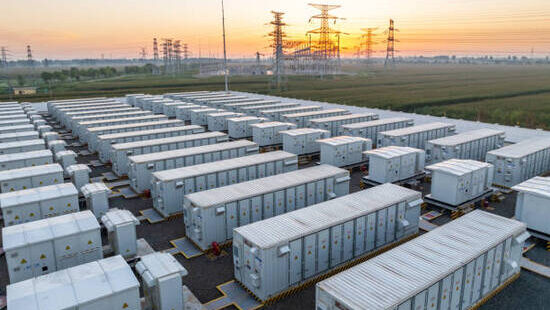
Aramco and Partners Reach Milestone in Building Phase One of CCS Hub in Jubail, Advancing the Kingdom’s Climate Goals
In a significant step towards global carbon management and climate change mitigation, Aramco, along with its strategic partners Linde and SLB, has reached a major milestone in the development of the Carbon Capture and Storage (CCS) hub in Jubail, Saudi Arabia. The project, which will play a critical role in reducing carbon emissions, marks an essential achievement in Aramco’s ambitious climate strategy, aligning with the Kingdom’s long-term sustainability targets.
Strategic Importance of the CCS Hub
The CCS hub, designed to become one of the world’s largest, is a cornerstone of Aramco’s emissions reduction strategy. The project’s first phase is set to be completed by 2027, with the capacity to capture and store up to nine million metric tons of CO2 annually. This capacity will be derived primarily from emissions at Aramco’s gas plants and other industrial sources in the region. The CO2 captured will be transported through an extensive pipeline network to be stored in a deep saline aquifer beneath the earth’s surface, making full use of the Kingdom’s geological potential for CO2 storage.
This initiative not only advances Aramco’s interim climate targets but also aligns with its broader vision of achieving net-zero Scope 1 and Scope 2 emissions across its wholly-owned and operated assets by 2050. The Jubail CCS hub plays a critical role in reaching this goal, with the company’s interim objective of reducing upstream emissions by 15% by 2035.
The Role of Global Partnerships
The milestone reached by Aramco, Linde, and SLB underscores the importance of collaborative efforts in achieving large-scale decarbonization. Under the terms of the shareholders’ agreement, Aramco holds a 60% equity interest in the project, while Linde and SLB each hold a 20% stake. This partnership is pivotal in advancing the technological innovation required for the success of such a monumental project, which will be a key contributor to Saudi Arabia’s climate goals and the global transition to a low-carbon economy.
Ashraf Al Ghazzawi, Executive Vice President of Strategy & Corporate Development at Aramco, emphasized the significance of this collaboration: “CCS plays a critical role in furthering our sustainability ambitions and our new energies business. This announcement represents a step forward in delivering on our strategy to contribute to global carbon management solutions and achieve our emission mitigation goals. Aramco’s collaboration with SLB and Linde demonstrates the importance of global partnerships in driving technological innovation, reducing emissions from conventional energy sources, and enabling new, lower-carbon energy solutions. This CCS hub is among several programs that will enable us to meet rising demand for affordable, reliable, and more sustainable energy.”
The impact of this collaboration extends far beyond Aramco itself. By joining forces Partner with Linde and SLB, Aramco taps into their expertise in decarbonization technologies and industrial-scale carbon management solutions. This strategic alliance is expected to accelerate the development and implementation of cutting-edge technologies for capturing and storing CO2, with far-reaching benefits for industries across the globe.

Technological Leadership and Innovation
Linde, a global leader in industrial gases and engineering, brings its innovative technology and vast experience in large-scale decarbonization projects. Oliver Pfann, Linde’s Executive Vice President for Europe, the Middle East, and Africa (EMEA), highlighted the importance of this collaboration in helping Saudi Arabia achieve its emission reduction targets. “Carbon capture and sequestration is essential for achieving the Kingdom’s emission reduction targets. Linde is proud to collaborate with Aramco and SLB, contributing Linde’s innovative technology and experience in delivering world-scale decarbonization projects. We look forward to jointly realizing this landmark project, which supports the development of a lower-carbon economy.”
SLB, formerly known as Schlumberger, brings a wealth of experience in CCS technologies, leveraging its proven portfolio of solutions for industrial decarbonization. Gavin Rennick, President of New Energy at SLB, expressed his pride in contributing to such a transformative project: “SLB is proud to be a part of ground-breaking efforts to enable abatement of millions of tons of CO2 annually through the Jubail CCS hub.
Leveraging our proven portfolio of CCS technologies and extensive experience in complex CCS Partner projects around the world, we are confident that SLB will play a critical role in advancing this important initiative. This project aligns perfectly with our commitment to industrial decarbonization, and we look forward to collaborating closely with Aramco and Linde to make it a success. ”The strategic collaboration between Aramco, Linde, and SLB is a testament to the power of global partnerships in addressing the climate crisis. By combining their technological expertise and resources, the three companies are poised to make a significant contribution to reducing global carbon emissions.
Support for Saudi Arabia’s Climate Vision
Aramco’s CCS hub in Jubail is not only a key element of the company’s sustainability strategy but also aligns with Saudi Arabia’s ambitious climate objectives. The Kingdom has set a target to achieve net-zero emissions by 2060, and the development of this Partner CCS hub is a vital step towards realizing that vision. The project reflects the Kingdom’s commitment to a circular carbon economy, where carbon emissions are captured, stored, and utilized in a way that contributes to the overall reduction of global emissions.
Saudi Arabia has long been a global leader in the energy sector, and the CCS hub in Jubail represents the country’s proactive approach to addressing climate change while maintaining its leadership in Partner energy production. The Kingdom’s vision is to not only reduce its own carbon footprint but also to become a key player in the global effort to combat climate change.
Phase One of the CCS Hub: Impact and Expectations
Phase one of the CCS hub in Jubail is expected to have the capacity to capture up to nine million metric tons of CO2 annually. The CO2 will be sourced from three of Aramco’s gas plants and other industrial sources in the region. The captured carbon will then be transported through a state-of-the-art pipeline network to a deep saline aquifer, where it will be securely stored below ground.
This first phase of the project is a critical step in reducing emissions and is expected to have a significant impact on Saudi Arabia’s overall emissions reduction efforts. As construction progresses towards completion in 2027, Aramco and its partners anticipate expanding the hub’s capacity in subsequent phases. This will ensure that the project remains scalable and adaptable to the growing demands of industrial decarbonization in the region and beyond.
The CCS hub in Jubail complements Aramco’s broader energy transition strategy, which includes its blue hydrogen and ammonia program. Blue hydrogen, which is produced using natural gas and CCS technology, is seen as a crucial element in the transition to a lower-carbon economy. The CCS Partner hub in Jubail will support the production of blue hydrogen and ammonia, positioning Aramco as a leader in the development of low-carbon energy solutions.
A Path Toward Net-Zero Emissions
Aramco’s long-term goal is to achieve net-zero Scope 1 and Scope 2 emissions across its wholly-owned operated assets by 2050. To achieve this, the company is committed to pursuing a range of emission mitigation strategies, including the deployment of CCS technologies, investment in low-carbon energy solutions, and the continued development of cleaner energy alternatives. The Jubail CCS hub is a critical part of this broader effort, serving as a cornerstone for Aramco’s emissions reduction strategy and contributing to the company’s overall sustainability goals.
In the interim, Aramco has set a target to reduce upstream emissions by 15% by 2035. The Jubail CCS hub will play a pivotal role in helping the company achieve this target, making it an essential element of Aramco’s near-term emissions reduction efforts. By capturing and storing millions of metric tons of CO2 annually, the CCS Partner hub will help the company make significant progress toward its interim climate goals.
Conclusion: A Global Model for Decarbonization
The CCS hub in Jubail represents a groundbreaking effort to address the challenge of carbon emissions on a global scale. Through strategic partnerships with Linde and SLB, Aramco is positioning itself at the forefront of industrial decarbonization, contributing to global carbon management solutions and advancing the Kingdom of Saudi Arabia’s long-term sustainability objectives. The development of this project is a critical step towards achieving net-zero emissions and creating a lower-carbon future for generations to come.
As the world continues to confront the challenges of climate change, initiatives like the Jubail CCS hub will play an increasingly important role in reducing global emissions and transitioning to a sustainable, low-carbon economy. Through innovation, collaboration, and commitment to sustainability, Aramco, Linde, and SLB are Partner leading the way toward a cleaner, more sustainable energy future.







